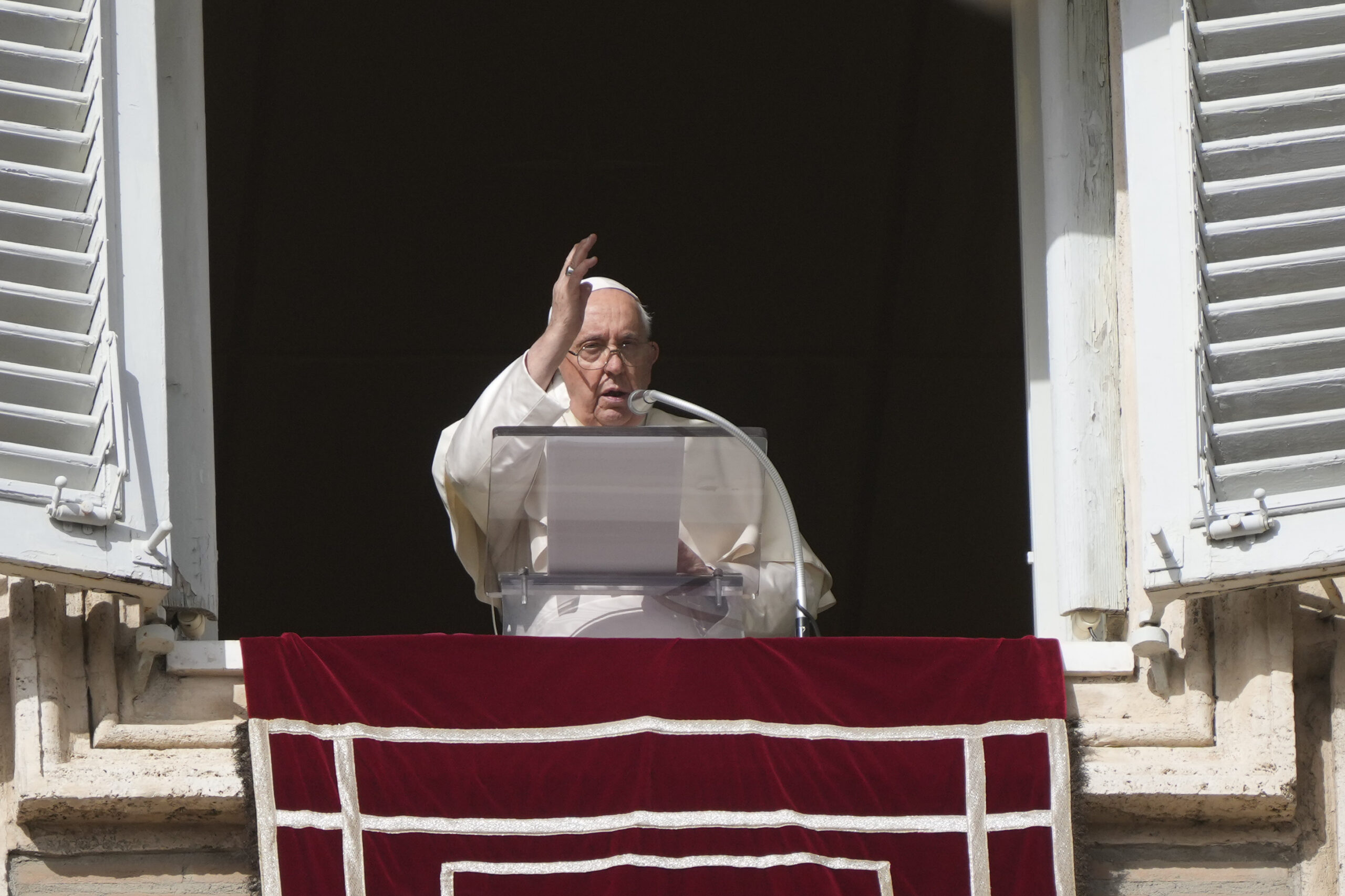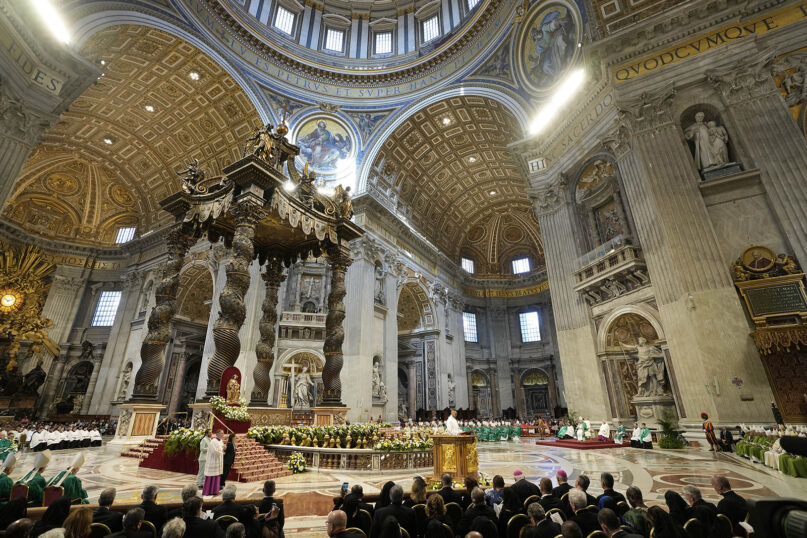VATICAN CITY (RNS) — After a massive consultation of Catholics around the world and a Vatican summit to discuss the future of the church, Pope Francis has directed theologians to tread new paths, shift paradigms and embrace synodality.
In a decree issued Nov. 1, Pope Francis challenged the Pontifical Theological Academy — the body tasked with instructing Catholic theologians — to embrace an evolving theology that cannot be limited to “abstractly rehashing formulas and patterns from the past.”
“A synodal, missional and ‘outgoing’ church can only correspond to an ‘outgoing’ theology,” Francis wrote in the decree, also known as a motu proprio. “Theological reflections are hence called to a turning point, a paradigm shift, ‘a brave cultural revolution,’” the pope added, emphasizing such a theology must meet people in the concrete reality of their lives, culture and environment.
According to the theologian Leonardo Paris, who teaches philosophy at the Romano Guardini Institute of Religious Sciences, the new papal bull is asking theologians to help realize Francis’ vision for a church that is open to today’s realities.
“In the document we can see that the pope is aware of the need for theological tools that will ensure that synodality, and new questions that arise, are properly addressed,” Paris told Religion News Service on Tuesday (Nov. 7).
Pope Francis recently concluded the so-called Synod on Synodality, a monthlong (Oct. 4-29) gathering of Catholic bishops and lay Catholic faithful at the Vatican to discuss some of the most hot-button issues in the church. The lively conversations that occurred touched on LGBTQ inclusion, female ordination and the possibility of married priesthood, as laid out in a synthesis document published Oct. 28.
On many issues the synthesis called for continued study by experts and theologians, taking into account other disciplines, including science and psychology. Specifically, on the issue of whether women can be ordained deacons — who can preach at Mass but not hear confessions or celebrate the Eucharist — the synod assembly called for more theological research ahead of their next meeting in the fall of 2024.
In an interview with the Italian news channel TG1, Francis asked for a theology that could recognize that “the power of the Woman Church and of women in the church is greater and more important than that of male ministers. Mary is more important than Peter, because the Church is woman.” This aspect cannot be reduced to a simple question of ordination, the pope stated.
“I think the pope is being sincere,” Paris said. “It’s a complicated issue and the pope wants to offer an answer that isn’t simply cultural or emotional, but also theological.”
Pope Francis’ approach to theology has evolved over the years. When he was an archbishop in Buenos Aires, Argentina, he criticized theologians for being more concerned with abstract ideas than the real lives of people. In his 10 years as pope, Francis has often remarked that the “pueblo fiel,” Spanish for the faithful, have an infallible intuition on Catholic teaching.

Pope Francis delivers a blessing during the Angelus noon prayer in St. Peter’s Square at the Vatican, Nov. 5, 2023. (AP Photo/Gregorio Borgia)
“To know what to believe one must look to the authority, but to know how to believe one must look to the faithful,” explained Massimo Borghesi, a philosopher at the University of Perugia and author of “The Mind of Pope Francis: Jorge Mario Bergoglio’s Intellectual Journey.”
According to Pope Francis, when authority becomes separated from the faith of the people it falls into clericalism, the belief that clergy hold a higher status within the church. “The church breathes through two lungs, the institution and charisms, the people and the authority,” Borghesi said, laying out the pope’s views.
Francis’ answer to the separation between the hierarchy and the faithful is synodality — an openness to dialogue and encounter with those of differing experiences and perspectives — which he is attempting to inject into every aspect of the church, including theology.
Theology is called to be “a transcendent knowledge, which is at the same time attentive to the voice of the people, hence a ‘popular theology,’” Francis wrote in his decree. To do this, theologians must embrace dialogue with different traditions and religions, “openly engaging with everyone, believers and non-believers,” he added.
This is nothing new, according to Paris, who said this understanding of theology was already enshrined in “Lumen Gentium,” Latin for “Light of Nations,” the final document emerging from the Second Vatican Council in 1964. “Following the council, this is the direction that theology has undertaken, or at least attempted to,” he said.
Of course, he added, engaging with literature is easier for theologians than engaging with highly specialized sciences. “Understanding quantum mechanics is not exactly a walk in the park,” Paris said.
There is some pushback against Francis’ vision for a “theologian who smells of the flock,” Paris admitted. “Lately in the church there is a polarization that seems to suggest that engaging in contextual dialogue is something new,” he said, pointing to “theological, but also ideological and cultural tensions.”
In the interview, Pope Francis criticized reactionaries “who don’t accept that the church moves forward.” Instead, the church must grow “like the fruit of the tree, but always attached to its roots,” the pope said.
Francis has often quoted fifth-century St. Vincent of Lérins, who laid out a vision for the harmonious development of Catholic teaching that is “consolidated through the years, developed over time, refined by age.” On the death penalty, on slavery and even on atomic weapons, doctrine has changed, the pope said, suggesting there is no reason why it shouldn’t change some more.
THIS STORY HAS BEEN UPDATED: A past version of this story incorrectly stated that the pope’s Motu Proprio reformed the International Theological Commission instead of the Pontifical Theological Academy.





